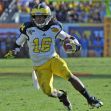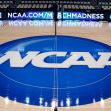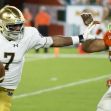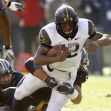Thursday (July 11), the Third U.S. Circuit Court of Appeals ruled that college players in Division I revenue-generating sports, such as football and basketball, cannot be categorically excluded from U.S. labor protections. This ruling challenges the NCAA's longstanding stance that athletes are "student-athletes, " not employees.
The decision came in response to a lawsuit filed by former Villanova football player Ralph “Trey” Johnson and a dozen other college athletes against the NCAA and a group of Division I schools. The athletes argued they should be entitled to bring claims under the Fair Labor Standards Act (FLSA), a 1938 law that ensures rights to a minimum wage, overtime pay, and restrictions on child labor. They contended that their extensive training and performance schedules, often taking precedence over academic commitments, constituted work.
The three-judge panel dismissed NCAA arguments that labor protections do not apply because college players are amateurs.
“Like ‘band-aid’ or ‘laundromat,’ ‘student-athlete’ is essentially a brand name that has become synonymous with its product. As scholars have noted, the term is an NCAA marketing invention,” the panel stated. The court emphasized that the historical definition of amateurism should not dictate the economic reality of athletes' relationships with their schools.
“Accordingly, we also hold that college athletes cannot be barred as a matter of law from asserting FLSA claims simply by virtue of a ‘revered tradition of amateurism’ in D-I athletics,” the court said.
The court highlighted that not all college athletes are the same and that what matters is whether the player is performing services for the school’s benefit in exchange for compensation. This standard means players in high-profile sports at wealthier schools may have the right to seek minimum wages and other benefits, while athletes at smaller, non-revenue-generating programs may not qualify.
“Merely playing sports, even at the college level, cannot always be considered commercial work integral to the employer’s business,” the court noted. “But just as intuitively, with professional athletes as the clearest indicators, playing sports can certainly constitute compensable work.”
The case will now return to a trial court for further proceedings to determine the specifics of each athlete's situation.
In a statement released late Thursday, the NCAA reiterated its commitment to modernizing college sports but maintained that athletes should not be classified as employees. They argued that such a classification could harm student-athletes' experiences and reduce opportunities in women’s sports, Olympic sports, and at Historically Black Colleges and Universities (HBCUs), as well as Division II and Division III levels.
“Student-athlete leadership from all three divisions agree that college athletes should not be forced into an employment model, which they expect will harm their experiences and needlessly cost countless student-athletes opportunities,” the NCAA stated.
The ruling comes after significant changes in college sports compensation. Recently, college sports leaders agreed to a new system allowing Division I schools to distribute approximately $20 million annually to their athletes. This shift was driven by the expanding wealth of college sports through lucrative television rights deals.
Public opinion and sentiment among coaches have increasingly supported sharing the financial gains of college sports with the athletes. However, the NCAA continues to resist categorizing athletes as employees, arguing that it would fundamentally alter the operation of college sports programs.
The litigation could take several more years to resolve fully, and the NCAA is facing similar legal challenges seeking employment rights for athletes. The National Labor Relations Board (NLRB) has issued an unfair labor practices complaint against the NCAA, Pac-12 conference, and University of Southern California, alleging they misled college players about their rights by calling them student-athletes.
Additionally, the NLRB is considering a bid by the Dartmouth men’s basketball team to have their union recognized, which could further influence the landscape of college athlete compensation and rights.






